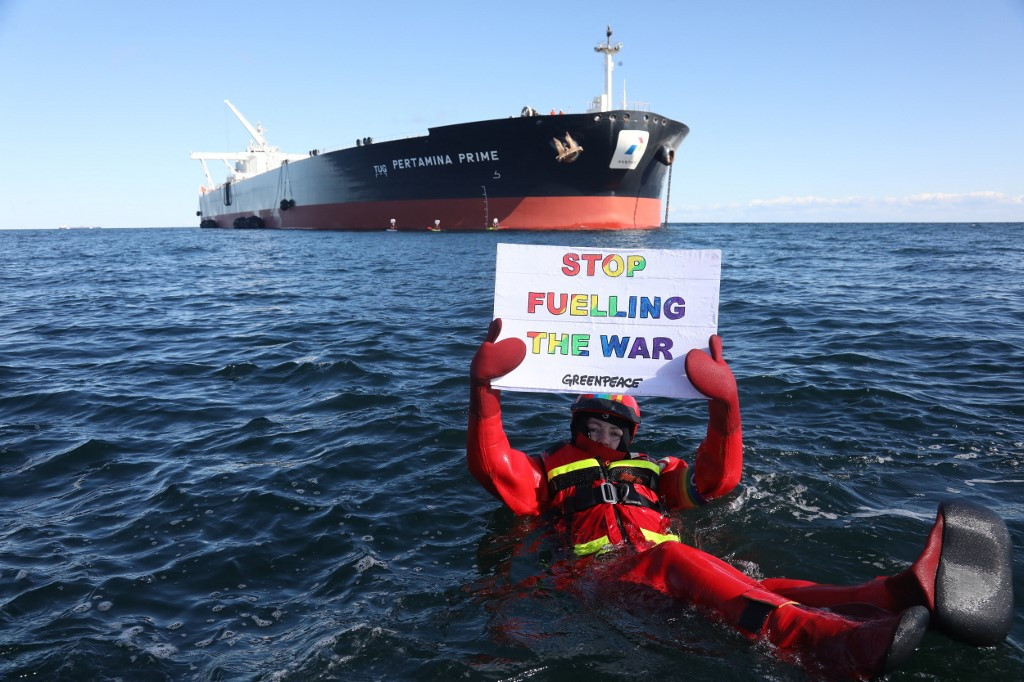Popular Reads
Top Results
Can't find what you're looking for?
View all search resultsPopular Reads
Top Results
Can't find what you're looking for?
View all search resultsLiving with more costly fuel
Most analysts and multilateral-development agencies have suggested that the government expand well-targeted cash-transfer social-assistance programs to protect low-income people.
Change text size
Gift Premium Articles
to Anyone
 This Handout photo made available by Greenpeace shows one of their activists holding an anti-war placard as they float in the water in front of the supertanker Pertamina Prime off the coast of Denmark on March 31, 2022, blocking the transshipment of a Russian oil shipment between two ships. (AFP/Kristian Buus/Greenpeace)
This Handout photo made available by Greenpeace shows one of their activists holding an anti-war placard as they float in the water in front of the supertanker Pertamina Prime off the coast of Denmark on March 31, 2022, blocking the transshipment of a Russian oil shipment between two ships. (AFP/Kristian Buus/Greenpeace)
G
iven the vital role of energy in the economy, the volatility of oil prices, and the painful fact that we must depend on imports for almost 60 percent of our fuel needs (which amount to 1.6 million barrels per day), the government has been woefully ignorant and irresponsible to not yet have set a permanent pricing system for domestic fuels.
President Joko “Jokowi” Widodo, like his predecessors, has never consistently implemented a long-term fuel-pricing mechanism with the objective of gradually familiarizing consumers with the real costs of fuel and simultaneously reducing both fuel consumption and carbon emissions.
So, when the Ukraine war caused the oil price to skyrocket to over US$100 per barrel, to more than twice its price in 2020, the government was caught off-guard, facing a dilemma between protecting the purchasing power of the people and maintaining prudent fiscal management.
The government was so confused that it now subsidizes Pertalite gasoline (RON 90); Pertamax (RON 92), which had previously been floated fully on market prices; and automotive diesel oil, which, together, account for over 95 percent of national fuel consumption.
Even more bewildering is that the government still stubbornly ties its fuel-pricing mechanism mostly to commodity-based subsidy, despite the fact that most analysts and multilateral-development agencies have suggested the government instead expand well-targeted cash-transfer social-assistance programs to protect low-income people.
The government cannot allow the blanket subsidy to continue, because subsidized fuels are highly vulnerable to abuse and to illegal export. The increasing fuel subsidy could also cause a fiscal time bomb, because most analysts have predicted the oil supply disruption will last longer than the market instability caused by the demand-supply imbalance.
If Jokowi cares about the long-term good of the economy and is really concerned about the risk of the ticking fiscal time bomb, he should seize the current energy crisis to design and implement a permanent pricing system to bring the domestic prices of fuels gradually closer to their economic costs.
Jokowi, currently in his final term, does not have the excuse of political burdens when taking ill-advised populist measures. Anyway, gasoline is only a tiny share of the consumption basket of poor households.
Taking lessons from other countries and policy recommendations of multilateral development agencies, the most effective pricing system is the mechanism that adjusts fuel prices on a monthly basis according to a fixed formula based on an international reference price, and including tax, excise tax and value added tax (VAT).
That way, the price adjustment would be gradual, not drastically abrupt as it is now, and the subsidy would be stable. Pricing is the most effective way to influence the behavior of consumers.
The pricing system needs only an executing institution and rules. We already have state-owned Pertamina to implement the system. The government only needs to set rules: a formula for the monthly price adjustments based on international prices, and the types of fuels that need to be subsidized.
The formula should be designed to gradually bring fuel prices closer to their economic costs, and subsidy should be strictly limited to the fuel which has the biggest impact on public transportation and logistics. Most importantly, the price adjustments should be made consistently.










